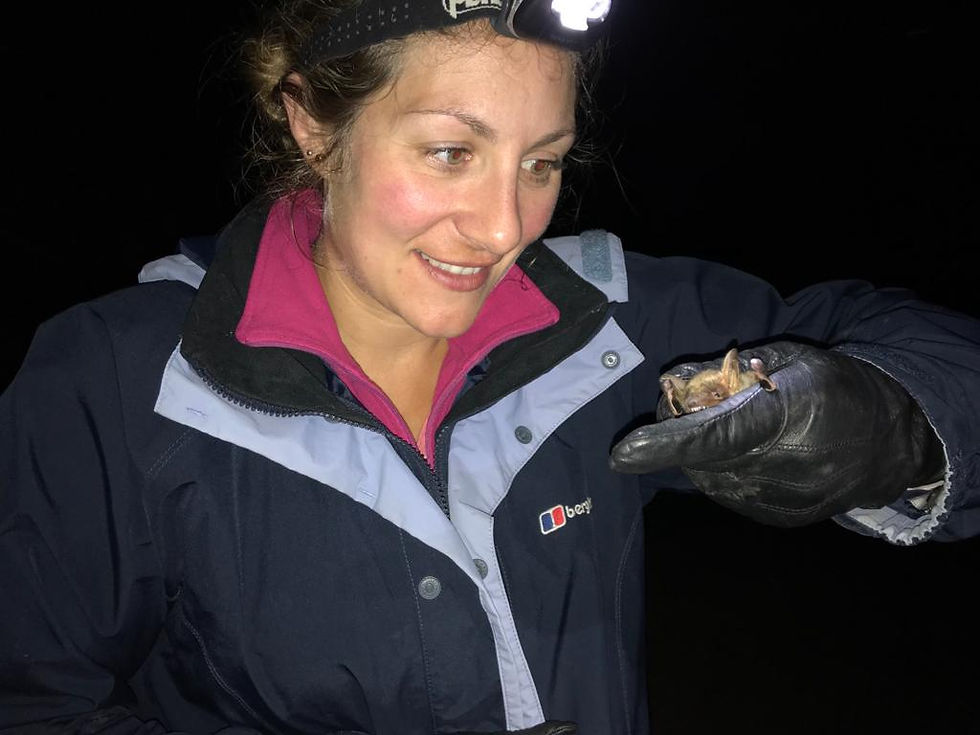DR Kim Wallis- Conservation Advisor and Bat Woman!
- Katie

- Aug 12, 2020
- 3 min read
Today we have the brilliant DR Kim Wallis to talk to us about her career as a conservation advisor and being batty for bats!
Short bio about yourself and your career:
I’ve always had an interest in animals and from a very early age my parents learnt I was happiest outside (apparently I was a bit of a pain otherwise!). I was lucky enough to grow up on a small farm so I think early exposure probably helped shape my career path. I started working as a Conservation Advisor for Essex & Suffolk Water in 2008 and with their support gained my PhD in 2017. My small

mammal exploits started shortly after my BSc and have continued in both my working and voluntary life. This primarily involves bats but also dormice with the former taking me overseas and seeing me spending a lot of time rehabilitating sick and injured bats. More recently I have got in ornithology and am registered as a trainee bird ringer which I am loving. Ringing and my involvement with Abberton Reservoir has also led to me becoming a Visiting Fellow with Essex University.
On a more personal level and away from work, I spend time with my horses, dog, friends and family (albeit in a slightly different and limited way at the moment). I’m partial to a good glass of wine or G&T!
How did your career begin?
Early on with interest and volunteering then completed degree in Ecology at Essex University. Following that I sent my CV to a few contacts and luckily one landed on the desk of Miranda who is now my boss!
One of the main reasons for my employment was to work on the Abberton Scheme which gave me valuable experience and has been fundamental to my career progression. Firstly because of the incredibly supportive and infinitely more experienced people I was lucky enough to work with and learn from, but also because I completed my doctorate using Abberton as a case study.
What does your job entail?
My job within the conservation and land management team is varied and aside from the usual budgetary, report writing and admin tasks, principally involves screening internal projects for ecological issues and enhancement opportunities; carrying out protected species surveys and subsequently providing advice which involves liaison with internal and external stakeholders; managing our land holdings for conservation and leading on the development of a scientific arm to the department.
Please highlight a conservation issue you are particularly involved in:

Bat conservation! I am one of Essex Bat Groups principle bat carers and rehabilitate sick and injured bats. Aside from the joy and reward of saving the lovely little critters, one very important role of bat care is influencing public perception of bats, which I’m sad to say, isn’t always good. When you show someone a bat in the hand though, be that one of the education bats I have (long term captives that are unable to be released), or a bat being released back to the wild (we take them back to where they were found), people get a different and positive experience. The interactions also provide a fantastic opportunity to explain the benefits of bats and dispel some of the myths surrounding them.
What can people do you help with this issue?
Learn and understand a bit more about bats, let the local records centre know of any roosts found and by keeping cats inside during peak activity times (around dawn and dusk). Sadly many of the bats carers see have been attacked by cats.
How did you get into bat care?
Many years ago I attended a bat walk with a friend and met a lady called Jan Ragg who cared for bats. I found it incredibly inspiring, started training with her and the rest is history! Jan sadly passed away a few years ago but I will always be grateful for all the advice she gave me.
Your greatest achievement:
Probably my PhD.
Your favourite species:
Ooh tough one! UK/EU wise, equally probably Leislers and the Brown Long Eared. Further afield (I spent three months studying bats in Mexico with Opwall last year), Centurio senex (wrinkle faced bat) or for cuteness, Artibeus phaeotis (pygmy fruit-eating bat).
Advice for people wanting to pursue conservation or ecology as a career?
Good choice and don’t give up! Get as much experience as you can which may involve volunteering and find what you are really passionate about.










Comments